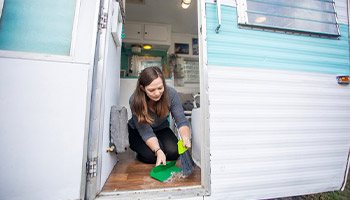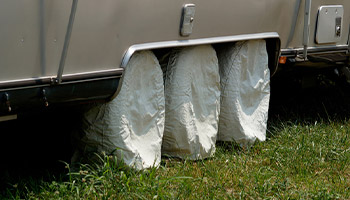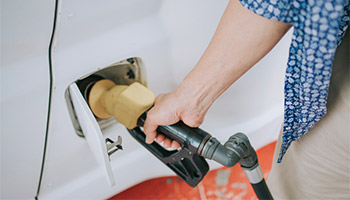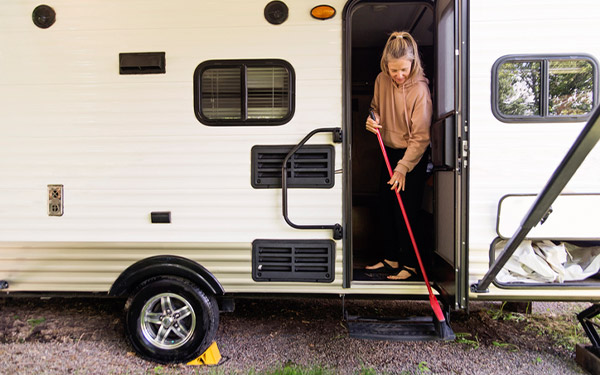With summer officially over, many of us have taken our last RV trip of the year. Unless you’re an avid snowbird or winter RVer, chances are you won’t use your rig for another adventure for a couple of months. Regardless of when your next trip is, practicing good RV storage habits will keep your RV free from issues involving water damage, pests, or mold during its offseason. So, if your parking blocks are ready, let’s cover a few tips on how to store your RV at home properly.
1) Remove All Food Items to Prevent Pests
Although it may seem like common sense, it’s easy to forget to remove all of your food items from your RV before putting it in storage. Sure, emptying the fridge is a no-brainer, but what about those cans of corn and sardines in your cabinets? Even if you have airtight canisters and sealed cans, it’s best to remove all food items from your RV if you won’t be traveling for a few months. The last thing you want is to return to your RV and find critters having a feast with your forgotten items.
To ensure you removed all food items, consider leaving your cabinets open to signal they’re empty and increase airflow. Be sure to also check around common food prep or dining areas to catch any leftover crumbs that may have fallen between seats. The more thorough you are, the better.
2) Treat Your RV to a Spa Day

After an entire season of RVing, it’s normal for your rig to need a wash. Before closing up shop and storing your RV for the offseason, clean your RV from top to bottom.
A good wash and wax will help protect your RV from sun damage if it is stored without a cover (not recommended) and keep excess dirt from building up. Once your RV is sparkling clean, inspect your rig to see if any exterior issues need to be addressed, such as cracks or damaged seals.
Read our blog on how to wash your RV to learn more about must-have cleaning supplies and cleaning tips.
3) Remove Your Battery Before Storing the RV
If you don’t want to replace your battery every year, remove it before you store your RV. We recommend disconnecting your battery and storing it in a cool, dry place to keep it safe from the elements, especially if you live in an area prone to extreme temperatures.
After removing your battery, you’ll need to check its charge every four to six weeks using a multimeter and recharge when necessary. A battery that isn’t fully charged has a greater chance of overheating or freezing in extreme temperatures when not in use.
4) Always Drain Your Fluids
If you’ll be winterizing your RV because you live in an area that experiences freezing temperatures, draining all water from your pipes is highly important. Any water left over in your RV can freeze and cause lines to burst, which is an expensive repair.
The goal is to drain all water housed inside your RV’s various tanks, such as the freshwater and greywater tanks. If you live somewhere besides the coastal areas of southern California and Florida, you may want to go the extra step of adding antifreeze to your pipes after you finish draining and flushing.
Always refer to your owner’s manual for detailed instructions on how to flush and drain your RV’s pipes. If you don’t feel comfortable performing the task yourself, you can always visit a reputable RV service center.
5) Don’t Forget About the Fridge
If you don’t want to return to a moldy kitchen during Spring, don’t forget to clean and defrost your fridge and freezer. Just like your cabinets, you’ll need to thoroughly clean these appliances before you store your RV.
After cleaning and defrosting the fridge and freezer, place a box of baking soda inside each and keep their doors open while in storage.
6) Protect Your RV’s Tires

RV tires are designed to take a lot of wear, but leaving them unprotected when your RV is in storage could cause more damage than you think. Leaving tires exposed to direct sunlight can cause the rubber to deteriorate, increasing the likelihood of a tire blowout. You don’t want to delay your first trip next season because you forgot to give your tires some TLC.
Ideally, you should park your RV on a level surface to prevent uneven weight distribution. If possible, use RV tire cradles for additional support that reduces the chance of flat spots. You can also regularly move your RV forward or backward monthly to prevent flat spots from developing.
For complete protection, invest in quality tire covers that will block your tires from interacting with the outside elements. This will help increase their longevity while in storage.
7) Cover it All Up
If you plan to store your RV outdoors during the offseason, use an RV cover. An RV cover will keep your paint job clean for the next season and protect your rig from harsh UV rays, bird droppings, and so much more. When shopping for your RV cover, consider purchasing one made of weather-resistant material with a snug fit. You don’t want a cover that leaves a lot of excess space for moisture or unwanted critters to enter while you’re rig is not in use.
8) Don’t Store Your RV on Empty

This may sound counterintuitive, but you should fill your gas tank before storing your RV. Why? To stop excess moisture from condensing inside your RV’s engine and causing corrosion.
After filling your tank to at least 80%, add a fuel stabilizer to keep the gasoline from breaking down during storage. You’ll need to run your RV’s engine for some time to ensure the fuel stabilizer circulates throughout the entire system.
RV Protection That Suits Your Needs
RV insurance protects your rig when you’re off exploring, but what about when your RV is in storage? Depending on your insurer, you may be able to adjust your coverage levels to suit your needs if you plan to store your RV for an extended period. Doing so could help you save on your premium while protecting your RV from potential damage from theft, vandalism, or a fire. To learn more about the coverage options available to you, call our RV insurance specialists today at (866) 501-7335.
The information in this article is obtained from various sources and is offered for educational purposes. Furthermore, it should not replace manuals or instructions provided by the manufacturer or the advice of a qualified professional. No warranty or appropriateness for a specific purpose is expressed or implied.
